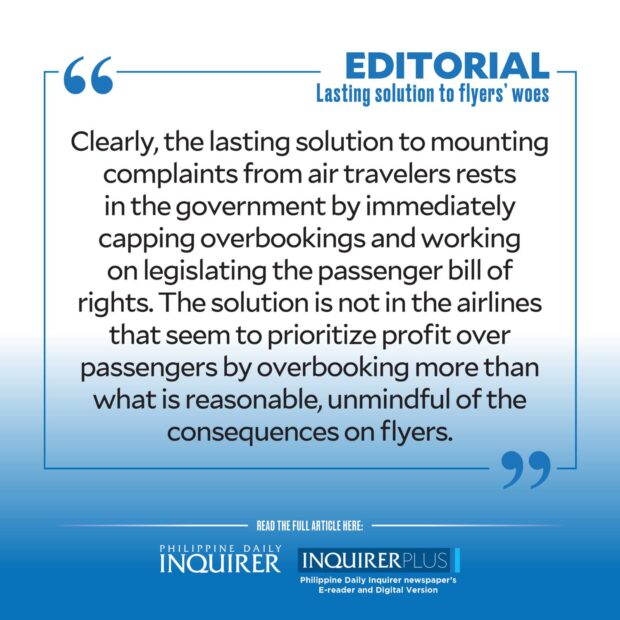Lasting solution to flyers’ woes
 Addressing airline passengers’ problems now rests squarely with the government. This became apparent during the Senate committee on tourism hearing last week on the riding public’s grievances against the Gokongwei-led Cebu Pacific Air, wherein Sen. Nancy Binay confronted the budget carrier with more than 3,000 complaints posted by exasperated passengers on social media. To be fair, it’s not only Cebu Pacific that is experiencing such problems. Distraught passengers were also flooding social media last week with pictures showing a number of flight cancellations involving flag carrier Philippine Airlines (PAL).
Addressing airline passengers’ problems now rests squarely with the government. This became apparent during the Senate committee on tourism hearing last week on the riding public’s grievances against the Gokongwei-led Cebu Pacific Air, wherein Sen. Nancy Binay confronted the budget carrier with more than 3,000 complaints posted by exasperated passengers on social media. To be fair, it’s not only Cebu Pacific that is experiencing such problems. Distraught passengers were also flooding social media last week with pictures showing a number of flight cancellations involving flag carrier Philippine Airlines (PAL).
The so-called “revenge travel” worldwide has brought many airlines back to profitability. But with more people wanting to fly than the number of seats available, the sudden surge in demand strained the capacities of many carriers. This resulted in such problems as offloaded passengers due to overbooking, a global practice wherein airlines sell more tickets than the capacity of the aircraft to ensure they will fly without an empty seat, thus maximizing revenues. As usual, passengers end up suffering and the sad part is that airlines seem not to mind their discomfort, thinking that rebooking and refunding are enough to appease them. What about the stress of the Cebu Pacific passenger who nearly missed the dentistry board exam last May 3 when she was informed that her May 1 flight from Dumaguete City to Manila had been moved four days later? Or the trauma of the couple and their child who were left at the Narita International Airport in Japan without food and commitment for accommodation while waiting for their next flight, and were thus forced to sleep on the floor of the airport, had to file an unscheduled leave from work, and their child had to skip classes?
Based on the Senate hearing, it became clear that the problem can be traced to two issues: overbooking and grounded planes due to maintenance delays, with just a few others caused by “freak incidents” and frequent “red lightning alerts” cited by Cebu Pacific president Alexander Lao. As disclosed by Carmelo Arcilla, executive director of the Civil Aeronautics Board (CAB), there is no threshold for air carriers overbooking flights, noting that the Air Passenger Bill of Rights approved in 2012 does not set a limit to the overbooking. What Arcilla is saying is that without a set limit, airlines can overbook as much as they want, but should be ready for the risk that “any expense, consequence, or inconvenience caused [by such overbooking] to affected passengers must be borne by the carrier.” Here lies the problem. If very few people cancel their bookings, several others will have to be offloaded from a flight, rebooked to the “next available flight” that may come in days or even weeks, or simply be refunded. This benefits an airline since it will profit from the full flight, with only minimal cost in rebooking the offloaded passengers or even refunding them. Hardly do these carriers provide accommodation and meals to affected passengers, as pointed out by the family stranded for a night at the Narita airport.
It is now incumbent upon Congress to pass a law on air passenger rights, to be crafted with inputs from the riding public. It is for passengers and should be reasonably crafted mainly by them. Lawmakers should not allow airlines to dictate its provisions. Once enacted into law, it will be illegal for carriers not to properly compensate offloaded passengers for all expenses, consequences, and inconveniences caused by such overbooking. In the meantime, CAB can immediately issue a memorandum to all airlines setting a limit on overbooking. While Arcilla did not say as much during the Senate hearing, he told CNN Philippines last Friday that he is recommending an overbooking cap of anywhere from 5 to 10 percent. Although still higher than the 2-5 percent range across the globe, this will be a good start. The aircraft maintenance issue cited by both Cebu Pacific and PAL is, to quote Cagayan de Oro Rep. Rufus Rodriguez, simply a “palusot” (excuse). To him, Cebu Pacific—and the other airlines for that matter—should have been ready for these realities on the ground. The issue is not about the availability of spare parts or maintenance, he said, but Cebu Pacific selling plane tickets when they don’t have the necessary aircraft to carry passengers for whatever reason.
CAB needs to wake up. As noted by Sen. Grace Poe, chair of the public services committee, the state regulator should take stern actions to stem the abuses of airlines, reiterating that “systemic delays and cancellations” of flights should not be the norm. “Canceled flights are not solved merely by rebooking or refunding,” Poe stressed. Clearly, the lasting solution to mounting complaints from air travelers rests in the government by immediately capping overbookings and working on legislating the passenger bill of rights. The solution is not in the airlines that seem to prioritize profit over passengers by overbooking more than what is reasonable, unmindful of the consequences on flyers.




















